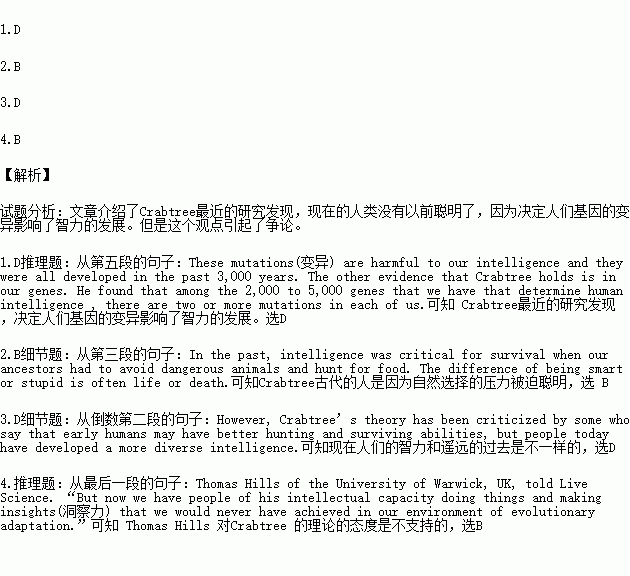题目内容
Are we getting more stupid? According to Gerald Crabtree, a scientist at Stanford University in the US, we are. You may not want to hear this, but Crabtree believes that human intelligence reached its peak more than 2,000 years ago and ever since then has been going downhill. “If an average Greek from 1,000 BC were transported to modern times, he or she would be one of the brightest among us,” Crabtree told The Guardian.
At the heart of Crabtree’s thinking is a simple idea. In the past, intelligence was critical for survival when our ancestors had to avoid dangerous animals and hunt for food. The difference of being smart or stupid is often life or death. However, after the spread of agriculture, when our ancestors began to live in dense ( 稠密的)farming communities, the need to keep their intelligence in peak condition gradually reduced. This is not hard to understand. Most of the time,pressure is what keeps us going – you need the pressure from your teachers to finish your homework; the pressure of looking pretty prompts(促使) you to lose weight when summer comes. And the same is also true of our intelligence – if we think less, we become less smart.
These mutations(变) are harmful to our intelligence and they were all developed in the past 3,000 years. The other evidence that Crabtree holds is in our genes. He found that among the 2,000 to 5,000 genes that we have that determine human intelligence , there are two or more mutations in each of us. However, Crabtree’s theory has been criticized by some who say that early humans may have better hunting and surviving abilities, but people today have developed a more diverse intelligence. For example, spearing a tiger doesn’t necessarily require more brainpower than playing chess or writing a poem. Moreover, the power of modern education means a lot more people have the opportunity to learn nowadays. “You wouldn’t get Stephen Hawking 2,000 years ago. He just wouldn’t exist,” Thomas Hills of the University of Warwick, UK, told Live Science. “But now we have people of his intellectual capacity doing things and making insights(洞察力) that we would never have achieved in our environment of evolutionary adaptation.”
1.What is Crabtree’s recent finding according to the article?
A. The Greeks from 1,000 BC could have been the smartest in human history.
B. Our ancient ancestors had no better surviving abilities than we do nowadays.
C. Humans have been getting steadily more intelligent since the invention of farming.
D. Mutations in genes that decide human intelligence have affected the development of intelligence.
2.According to Crabtree, ancient humans _______.
A. had many more genes that determine human intelligence
B. were forced to be smart due to natural selection pressures
C. relied more on group intelligence than individual intelligence
D. developed a diverse intelligence to adapt to the hard realities
3.Some argue that Crabtree’s theory is false because they think _______.
A. people today are under much more pressure than early humans
B. it’s ridiculous to compare a hunter’s and a poet’s intelligence
C. modern education is far more advanced than ancient education
D. human intelligence nowadays is different from that of the distant past
4.What is Thomas Hills’ attitude toward Crabtree’s theory?
A. Supportive B. Unfavorable
C. Worried D. Confused


 ging songs about love and her sweet voice _________ me a bit. Then I stood there watching her playing, thinking that it must take _________ to perform on her own in front of hundreds of people she didn’t know.
ging songs about love and her sweet voice _________ me a bit. Then I stood there watching her playing, thinking that it must take _________ to perform on her own in front of hundreds of people she didn’t know.